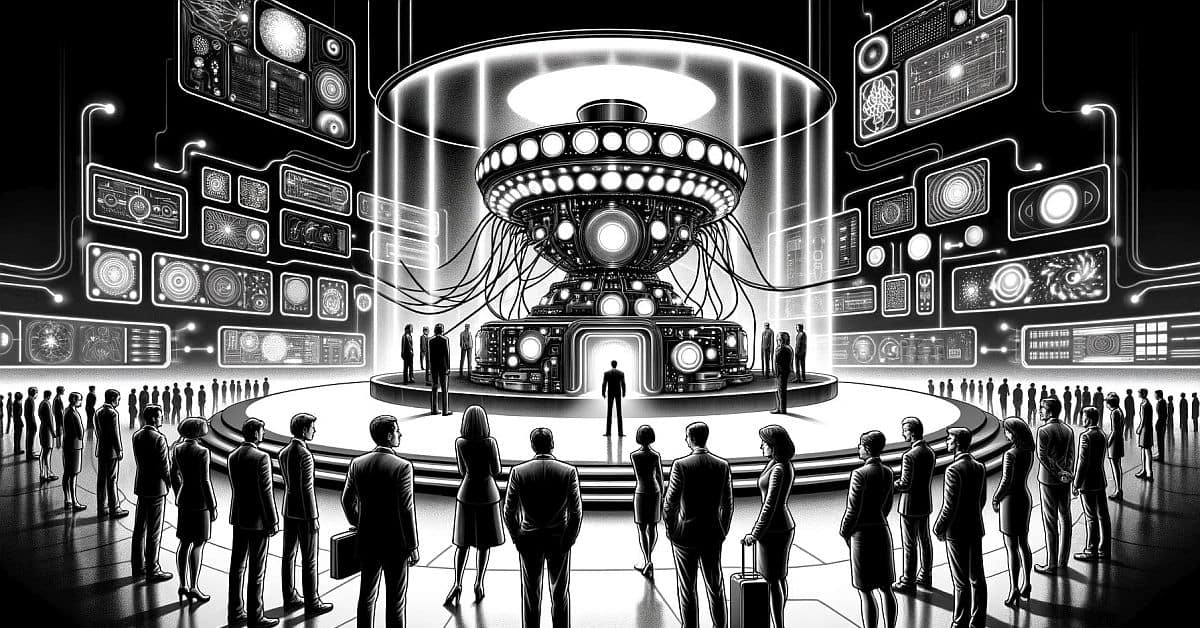 Knowing the experiences are not real, would we choose to plug into this machine for life?
Knowing the experiences are not real, would we choose to plug into this machine for life?
The Experience Machine #
What is “The Experience Machine” experiment about? #
“The Experience Machine” is a thought experiment introduced by philosopher Robert Nozick in his 1974 book, “Anarchy, State, and Utopia”. It serves to explore the nature of happiness, ethics, and the reality of our experiences. The thought experiment challenges the idea that only subjective experiences of happiness are important by posing a question about living a life in a simulation that could guarantee artificial happiness.
In the experiment, Nozick asks us to imagine a hypothetical machine capable of simulating any desirable experience we could want. Once hooked up to this machine, one could experience a perfectly satisfying life according to one’s specific desires—everything from writing a great novel to having a loving family could be experienced as if it were real, even though none of it would actually be happening. You would not know that these experiences were not real; as far as you would be concerned, they would be genuinely occurring.
Nozick then poses a critical question: knowing the experiences are not real, would we choose to plug into this machine for life, thus foregoing any actual contact with reality, or would we prefer to live in the real world with all its imperfections and occasional suffering?
The significance of this thought experiment lies in its challenge to hedonism—the idea that pleasure is the highest good and sole aim of human life. Nozick argues that human beings value things beyond mere pleasure, such as actually doing certain things and being a certain kind of person, rather than just having the experience of doing them. It implies that the authenticity of our experiences and the reality of our achievements are important to us, suggesting that humans value more in life than just pleasurable experiences. This argument is instrumental in discussions about the nature of well-being and what it means to live a good life.
If we imagine a worldwide offering of this choice, what would be our rough estimate of the percentage of people likely choosing simulation? #
Estimating the percentage of people who might choose to live permanently in an experience machine (as posed by Robert Nozick’s thought experiment) involves several complex psychological, cultural, and philosophical considerations. There isn’t empirical data directly addressing this hypothetical scenario, but we can infer possible tendencies from related research and philosophical debates.
Cultural and Individual Differences in Value Systems: People’s decisions would likely vary significantly based on cultural backgrounds and personal values. For instance, societies that place a high value on personal achievements and authenticity might see lower percentages of people choosing the simulated life. Conversely, in cultures where happiness or pleasure is highly valued, more individuals might opt for the simulation.
Economic and Social Conditions: Individuals living in adverse conditions—such as poverty, war, or severe personal hardships—might be more inclined to choose a simulated reality that promises an escape from suffering. The allure of a life without pain or struggle could be compelling for those who feel trapped by their circumstances.
Psychological Factors: Personality traits such as openness to experience, neuroticism, or the degree of existential security one feels could also influence this decision. Those who are more adventurous or deeply connected to the real world might reject the idea, while those more prone to anxiety or dissatisfaction with their current lives might be more accepting.
Philosophical and Ethical Perspectives: People who engage with and prioritize philosophical considerations, such as the nature of reality and the value of authentic experiences, might choose to remain in the real world. Those who prioritize happiness and pleasure over these factors might opt for the machine. From a theoretical perspective, we might consider a bifurcation based on immediate intuitive appeal versus deep philosophical reflection:
Initial Appeal: A significant portion of the population might initially find the idea appealing, especially if framed as a way to achieve guaranteed happiness without real-world risks or pains.
Upon Reflection: After deeper consideration, a substantial number might decide against it, valuing authenticity, the intrinsic nature of real achievements, and the fundamental human experience.
If forced to speculate, it’s reasonable to suggest a broad range of responses, potentially with a significant minority or even a majority in some scenarios opting for the simulation, influenced heavily by how the choice is presented and the current state of the world or individual circumstances at the time of choice. This diversity in choice underscores the complexity of human desires and the profound philosophical questions about what constitutes a life worth living.